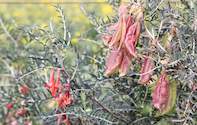
Environmental affairs and tourism minister Marthinus van Schalkwyk officially opened the new South African National Biodiversity Institute (SANBI) on December 2, 2004. The institute is a product of the new National Environmental Management Biodiversity Act that came into law this year, and is based in Pretoria. It replaces the 15 year-old National Botanical Institute (NBI), and was initiated by Valli Moosa, former minister and newly elected president of the World Conservation Union (IUCN).
Van Schalkwyk declared at the opening "SANBI will provide us with the tools to take conservation and biodiversity to new heights in the 21st century." He also described the Biodiversity Centre as set to become "a global hub for biodiversity".
The minister pointed out that South Africa straddles three oceans, and is home to almost 15 percent of all known coastal marine species, 10 percent of all plants, and seven percent of birds, reptiles and mammals. He said that the challenges confronting the country's living resources have changed with time, and with this in mind "we are clearly in need of world-class science to inform our policy decisions, and world-class capacity to protect our national treasures."
At the opening the minister cited some of the priorities for SANBI, one of the major ones being a national biodiversity assessment which is due to be published early next year. The study will provide the planning framework for bioregional programmes for the next ten years, one of which is the new Grassland Biome Project due to be launched soon.
SANBI will monitor South Africa's ecosystems and report back to the minister on the conservation status of the country's biodiversity. It will also provide facilities for environmental education, research and horticultural display, and play a role in regulating public access to places that are protected.
The minister also announced that R70 million has been allocated to the "Greening of the Nation" project, which has an emphasis on planting indigenous trees to green urban areas, rehabilitate degraded land and prevent the extinction of medicinal plants and trees.
Other initiatives include upgrading botanical gardens such as the Lowveld Garden in Nelspruit, the Walter Sisulu Garden in Roodeport and the Free State Garden in Bloemfontein. Van Schalkwyk said that R40 million was due to be invested in the upgrading over the next two years. About R60 million has already been spent through the Poverty Relief Programme, with the creation of more than 60,000 workdays of employment for 826 people, with up to 100 permanent jobs being created.
The minister also announced the new members of the SANBI board, which is chaired by Ms Bongiwe Njobe, the director general of the department of agriculture. Other members include David Mabunda, the CEO of South African National Parks, Saliem Fakir, the outgoing NBI chairman, and various scientists from government and non-governmental organisations.

 While Stevenson-Hamilton believed in 'a balance of Nature', evidence suggests that the natural environment is never in a constant state of e...
While Stevenson-Hamilton believed in 'a balance of Nature', evidence suggests that the natural environment is never in a constant state of e...